Country rock is a music genre that fuses rock and country. It was developed by rock musicians who began to record country-flavored records in the late 1960s and early 1970s. These musicians recorded rock records using country themes, vocal styles, and additional instrumentation, most characteristically pedal steel guitars. Country rock began with artists like Buffalo Springfield, Michael Nesmith, Bob Dylan, Nitty Gritty Dirt Band, the Byrds, the Flying Burrito Brothers, The International Submarine Band and others, reaching its greatest popularity in the 1970s with artists such as Emmylou Harris, the Eagles, New Riders of the Purple Sage, Linda Ronstadt, Little Feat, Poco, Charlie Daniels Band, and Pure Prairie League. Country rock also influenced artists in other genres, including The Band, the Grateful Dead, Creedence Clearwater Revival, The Rolling Stones, and George Harrison's solo work, as well as playing a part in the development of Southern rock.

My Generation is the debut studio album by English rock band the Who, released on 3 December 1965 by Brunswick Records in the United Kingdom, and Festival Records in Australia. In the United States, it was released on 25 April 1966 by Decca Records as The Who Sings My Generation, with a different cover and a slightly altered track listing. Besides the members of the Who, being Roger Daltrey (vocals), Pete Townshend (guitar), John Entwistle (bass) and Keith Moon (drums), the album features contributions by session musician Nicky Hopkins (piano).
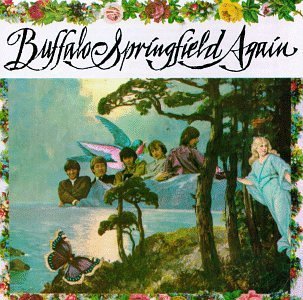
Buffalo Springfield Again is the second album by Buffalo Springfield, released on Atco Records in October 1967. The album features some of the group's best-known songs, including "Mr. Soul", "Bluebird", "Expecting to Fly" and "Rock & Roll Woman", all of which were released as singles. In contrast to the band's hastily made debut album, recording for Again took place over a protracted nine-month span and was fraught with dysfunction, with each member eventually producing his own material largely independent of one another.

William Nelson is an English singer, guitarist, songwriter, producer, painter, video artist, writer and experimental musician. He rose to prominence as the chief songwriter, vocalist and guitarist of the rock group Be-Bop Deluxe, which he formed in 1972. Nelson has been described as "one of the most underrated guitarists of the seventies art rock movement". In 2015, he was recognised with the Visionary award at the Progressive Music Awards.
Roots rock is a genre of rock music that looks back to rock's origins in folk, blues and country music. It is seen as responses to the perceived excesses of the dominant psychedelic and the developing progressive rock. Because roots music (Americana) is often used to mean folk and world musical forms, roots rock is sometimes used in a broad sense to describe any rock music that incorporates elements of this music.
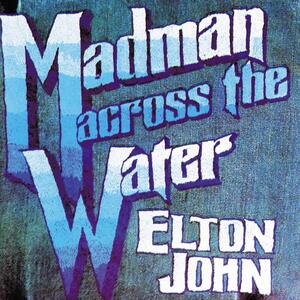
Madman Across the Water is the fourth studio album by English musician Elton John, released on 5 November 1971 by DJM and Uni Records. The album was his third album to be released in 1971, at which point John had been rising to prominence as a popular music artist. John's first progressive rock album, Madman Across the Water contains nine tracks, each composed and performed by John and with lyrics written by songwriting partner Bernie Taupin. Yes keyboardist Rick Wakeman plays Hammond organ on two songs.

Herbs are a New Zealand reggae group founded in 1979 and led by singer-guitarist Dilworth Karaka, the only constant member. Since its foundation Herbs has been multi-ethnic in membership and featured Samoans, Tongans, Cook Islanders, New Zealand Europeans and Maori members. The 11th inductees into the New Zealand Music Hall of Fame, were once described as "New Zealand's most soulful, heartfelt and consistent contemporary musical voice". It has been said their debut EP What's Be Happen? "set a standard for Pacific reggae which has arguably never been surpassed".

Salisbury is the second studio album by English rock band Uriah Heep, released in January 1971 by Vertigo Records in the UK and Mercury Records in the US. It was produced by Gerry Bron.

Slapp Happy is a studio album by German/British avant-pop group Slapp Happy, recorded at Virgin Records' Manor Studio in 1974.

Ultravox! is the debut studio album by British new wave band Ultravox. It was recorded at Island Studios in Hammersmith, London in the autumn of 1976 and produced by Ultravox and Steve Lillywhite with studio assistance from Brian Eno. It was released on 25 February 1977 by Island.

Be-Bop Deluxe were an English rock band who achieved critical acclaim and moderate commercial success during the mid to late 1970s.
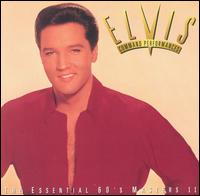
Command Performances: The Essential 60s Masters II is a two-disc compilation of studio master recordings by American singer and musician Elvis Presley during the decade of the 1960s, released in 1995 on RCA Records, catalogue number 66601-2. It also includes a booklet with session details and an essay by Susan M. Doll.

Charles Turu Tumahai was a New Zealand singer, bass player and songwriter who was a member of several noted rock groups in New Zealand, Australia and the UK. He is best known internationally as the bassist and backing vocalist in Bill Nelson's Be-Bop Deluxe.

Drastic Plastic is the fifth and final album by English rock band Be-Bop Deluxe, released in February 1978.
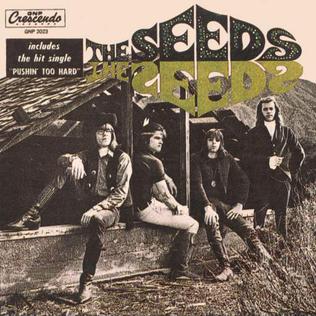
The Seeds is the debut album by American garage rock band the Seeds. It was released in April 1966 through GNP Crescendo Records and produced by Sky Saxon. After the release of two singles in 1965, "Can't Seem to Make You Mine" and "Pushin' Too Hard", the album was released and charted in the United States where it peaked at No. 132 on the Billboard Top LPs & Tapes chart. Modern reception of the album is positive, with Malcolm Russel noting the band's influence on CBGB musicians a decade later.

Sunburst Finish is the third studio album by English rock band Be-Bop Deluxe, released in February 1976. It was recorded in Abbey Road Studios, London.
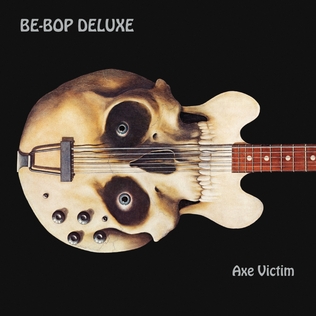
Axe Victim is the debut album by English rock band Be-Bop Deluxe, released in June 1974.

Watusi is a studio album by The Wedding Present. It was released in 1994 on Island Records. It peaked at No. 47 on the UK Albums chart.

Playmates is the fourth studio album, and the first during their reunion, by English rock band the Small Faces. The album was created by Steve Marriott, Ian McLagan, Kenney Jones and Rick Wills when they reformed in the late 1970s and recorded it along with the album 78 in the Shade. Ronnie Lane left before the album was recorded.

Modern Music is the fourth studio album by English rock band Be-Bop Deluxe. It was produced by band leader Bill Nelson and producer/engineer John Leckie. As AllMusic reviewer William Ruhlmann states in his review, "the album charted high in England and made the Top 100 in the U.S., but it was Be Bop's peak, not its breakthrough.

















